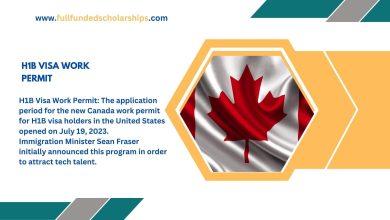Visa Information of Switzerland 2023 – How To Apply

Visa Information of Switzerland 2023: Switzerland has tight quotas for foreign workers, and everyone must have a work permit to lawfully work there. Here is all you need to know about obtaining a work visa for Switzerland. If you intend to work in Switzerland, you may need a visa, and you will need a residence permit if you intend to stay longer than three months. This guide to the Swiss work visa addresses the following subjects:
- Working in Switzerland
- Who requires a work visa in Switzerland?
- Switzerland work permit
- Work licences in Switzerland
- Swiss work visas for students
- Work permits for entrepreneurs and freelancers
- Visas for temporary and seasonal employees in Switzerland
- Volunteering and internships in Switzerland
- Family employment visas in Switzerland
- Objections and objections regarding Swiss work permits
- Useful resources
Working in Switzerland
Switzerland possesses one of the world’s most robust economies and a highly skilled labour force. However, the Swiss government strictly controls the number of incoming workers.In recent years, the number of Switzerland work visas awarded to non-European Union (EU) and European Free Trade Association nationals has decreased (EFTA, which consists of Iceland, Liechtenstein, Norway, and Switzerland).
In addition to tightening application procedures, the Swiss immigration authorities have increased wage criteria and tightened extension regulations. Generally, only individuals who meet the requirements or operate in an industry with a shortage are granted a Swiss work visa.
By the end of 2019, there were over 1,7 million foreign workers in Switzerland, representing roughly 20% of the national workforce. Many hold professional positions in top industries such as finance, pharmaceuticals, and food retailing. The Swiss work visa quotas for 2021 are as follows:
8,500 visas for non-EU/EFTA citizens (4,500 long-term B permits and 4,000 short-term L permits).
3,500 licences for British employees (2,100 long-term B permits and 1,400 short-term L permits).
In Switzerland, the State Secretariat for Migration (SEM) is responsible for Swiss visas and immigration, while cantonal migration offices issue residence permits and handle the majority of administration.
Who Needs a Work Visa For Switzerland?
Switzerland runs a dual system for the right to seek work in the country, with different laws for EU/EFTA citizens and non-citizens.
Although Switzerland is not a member of the EU, it is a member of the EFTA and hence offers EU and EFTA citizens freedom of movement. EU and EFTA nationals can enter Switzerland and seek employment without a visa. They are permitted to remain for three months (sometimes extended to six months) while seeking employment. If they have employment that will require them to remain in Switzerland for more than three months, they must obtain a Swiss residence visa. Croats are subject to slightly different regulations.
Non-EU/EFTA nationals must obtain a Switzerland work visa prior to entering the country. You must first receive an offer of employment from a Swiss employer. In addition, you must meet additional standards, such as possessing a high level of qualification.
Students and immediate family members of C settlement permit holders are exempt from this requirement. On a student visa, students are permitted to work a specified number of hours per week, whereas some relatives of Swiss residents are permitted to work on their Swiss family visa.

The Switzerland Work Visa
Switzerland differs from the majority of European nations in that a residence permit is required prior to applying for a work visa. Your future employer submits the permission application on your behalf (see the below section). This means that you must already have a job before applying for a Swiss visa.
Switzerland’s work visa is a Schengen category D visa for stays exceeding 90 days.
Requirements
To qualify for a work visa in Switzerland, you must satisfy the following criteria:
- have an offer of employment in Switzerland
- Be a manager, expert, or highly qualified employee (i.e., have degree-level qualifications and several years of professional experience).
- You are applying when annual work permit quotas are not at capacity.
- There is no suitable candidate in Switzerland or any EU/EFTA country.
- Your job offer has the same salary and working conditions as those applicable to Swiss citizens.
- For many positions, authorities also evaluate language skills, capacity to assimilate into Swiss society, criminal background, and ability to support oneself and any family members joining you.
How to apply
After securing employment in Switzerland, your employer applies for your work permit with the immigration department in their canton. This permits you to reside and work in Switzerland. The application is subsequently sent to the SEM for approval.
As soon as you find employment in Switzerland, you can apply for a work visa at the Swiss embassy or consulate in your home country. However, a work permit is required before a visa can be issued. If your application for a work permit is approved, the cantonal migration office will contact the embassy or consulate regarding visa approval. In addition to the visa application form, you must submit the following:
- Copy of your passport or acceptable travel identification Documentation of your job offer (e.g., an offer letter, a copy of the employment contract)
- Your resume and copies of your academic and professional credentials in German, French, Italian, or English (translated by an official translator if necessary)
- Processing a visa application typically takes eight to ten weeks.
Visa Costs
Currently, a visa for category D costs CHF 88. If you need the visa expedited or outside of typical business hours, you may have to pay up to 50 percent more than the standard fee. You must include payment with your application.
Visa Length
Typically, Swiss work visas are good for one to five years. If you have a short-term contract of 12 months or less, you will likely receive a one-year L permit that is not renewable. For contracts lasting more than one year, a B permit is issued, which can be renewed annually. You can apply for a settlement permit after ten years in Switzerland (or five years if you’re from the EU/EFTA, the United States, or Canada).
It is not possible to enter Switzerland as a tourist and then obtain employment. If you want to work in Switzerland, you must leave the country and apply from your home country.
Work Permits in Switzerland
In Switzerland, your work permit is effectively your residency permission. This differs from your work visa, which is the document you must submit at border control to enter Switzerland. While you are responsible for submitting your visa application, your Swiss employer submits your work permit application to the cantonal migration authorities.
Types of Swiss Work Permits
Foreign workers requiring a work visa in Switzerland will be awarded one of two types of permits:
- Permit L—for a temporary residency permit that enables up to one year of stay in Switzerland The L permit is related to the terms of the employment contract and may be extended in extraordinary circumstances for an additional year, but not longer, if the same employer is maintained.
- Permit B: This is an initial or temporary residency permit that is good for one year but can be renewed annually if there are no reasons why it should not be renewed (e.g., being a recipient of welfare benefits). These permits are quota-based and related to the same employer. Permits frequently stipulate that the holder must reside in the canton that issued the permit and cannot leave the canton.
- If you have continuously resided in Switzerland for ten years (or five years if you are a citizen of the United States or Canada), you are eligible to apply for Permit C, which is a settlement permit. When eligible, those who work in Switzerland on a long-term basis with a B permit frequently switch to a C permit. Nonetheless, this is not required. See our guide to Swiss citizenship for additional details.
Getting Your Permit
Although your company will have arranged for your Swiss work permission prior to your arrival in Switzerland, you must report to the cantonal immigration office that issued your permit prior to beginning work for your Swiss employer and no later than 14 days following your arrival.
Typically, it is your responsibility to renew your permit with the cantonal authorities. This should be completed no later than two weeks prior to the expiration date.
The cost of a work permit varies by canton but is normally around CHF 160. Employers in Switzerland occasionally subsidise permit fees.
Switzerland Work Visas for Students
If you are studying in Switzerland on a student visa, you do not require a separate work visa. However, you cannot work in Switzerland on a student visa until you have lived there for six months. During term time, you may only work a maximum of 15 hours per week.
Those with a Master’s degree or higher can immediately begin working for the Swiss university or institute where they are enrolled.
Before you can begin working as a student in Switzerland, your employer must obtain a work permit, and you must notify the cantonal immigration office of your job.
Work Visas in Switzerland For Self-employed, Freelancers, and Entrepreneurs
Switzerland does not issue visas for self-employment. Those who want to start their own firm or operate independently typically require a settlement permit. To become self-employed, you must have lived in Switzerland for at least five years and, in many situations, ten years.
The two primary exceptions are:
Those married to Swiss nationals or permanent residents who can work independently using a family visa
If they are willing to make an annual lump-sum tax payment of at least CHF 150,000, entrepreneurs with a business plan that would boost jobs and the economy can obtain an investment visa and a settlement permit.
Aside from this, cantonal authorities and SEM may occasionally approve requests for self-employment if they believe there is a substantial economic advantage and you meet specific personal, financial, and commercial standards. You should inquire with the cantonal government in your area.
Work Visas in Switzerland For Seasonal/Temporary Workers
Switzerland does not grant seasonal, short-term, or summer workers with special short-term visas. You must instead apply for a category D visa and receive a L permit that permits you to remain in the country for up to one year.
If you are from a country that requires visas to enter Switzerland, you must apply for a Schengen short-stay C visa if you are coming to Switzerland for a business trip, work-related event, or official visit lasting less than 90 days.
You can work as an au pair in Switzerland if you are between the ages of 18 and 25 and are placed through an au pair agency. The licence must be issued by the Swiss State Secretariat for Economic Affairs (SECO). Your host family must submit an application for your visa and permit to their cantonal migration office.
Volunteering and Work Experience in Switzerland
If you are under 35 years old, you can volunteer or gain work experience in Switzerland. Volunteering and internships are viewed as equivalent to paid employment with regard to visa requirements. In other words, if you are from a country that requires a visa for admission into Switzerland and your stay will be less than 90 days, you will need a Schengen C visa that corresponds to your travel purposes.
For longer postings, you require a category D visa, and the volunteer organisation must obtain a L permit for you. This has a maximum duration of one year.
Switzerland operates a “Young Professionals” (trainees) program that allows nationals of the following nations to work in Switzerland for up to 18 months. This program is available to citizens of Argentina, Australia, Canada, Chile, Japan, Monaco, New Zealand, the Philippines, Russia, South Africa, Tunisia, the United States, and Ukraine.
To qualify, you must:
- Be between the ages of 18 and 35 (18–30 if you’re from New Zealand or Russia, 20–30 if you’re from Australia).
- either finished occupational training or obtained a suitable degree.
- Trainees must locate an internship relevant to their field of study or profession, and they must be compensated at rates commensurate with the industry and area. You cannot accept any further employment. The Swiss embassy or consulate in your home country handles applications. Your trainee provider will manage your work authorization.
Applicants for Young Professionals from Japan, Monaco, and New Zealand do not need a work visa.Foreign nationals must get a Swiss visa from their embassy or consulate.
Switzerland Work Visas for Family Members
Relatives who enter Switzerland on a family visa are permitted to work and have the same job rights as their joining family member. Initially, they must register with the cantonal immigration and labour market authorities.
Only residents holding C settlement permission may have family members join them. Spouses, children, grandkids, parents, and grandparents can accompany EU/EFTA permit holders. In Switzerland, spouses who marry have the right to become self-employed.
Holders of a C permit from a third country may only be accompanied by spouses, partners, and children under the age of 18. Spouses are permitted to work or pursue self-employment.
Those holding B or L residence permits do not automatically have the right to be joined by family. In rare cases, cantonal authorities may permit spouses and dependent children. In such cases, spouses will be permitted to work in Switzerland.
Appeals and Complaints About Work Visas in Switzerland
If you are denied a Swiss work visa for any reason and are dissatisfied with the decision, you must contact the Swiss embassy or consulate in your home country within thirty days to file a formal complaint.
If the embassy or consulate is unable to provide a suitable response, you may contact the SEM, the Swiss authority responsible for Swiss visas and permits. You must pay a deposit on fees totaling CHF 200.
If your appeal is denied by SEM, your final recourse is the Federal Administrative Court. Your appeal must be filed within 30 days. Send your appeal and any supporting documentation to:
Frequently Asked Questions
-
Can I apply online for a Swiss visa?
Depending on your nationality, travel to Switzerland requires a visa. Only short-term visa applications (up to 90 days for a Schengen visa) can be submitted online, including tourist, visit, and business visas. The earliest a visa application can be submitted is six months prior to entry into the Schengen area.
-
How can I schedule an appointment for a Swiss visa?
Schedule an appointment.
Exceptional services. Enjoy a faster, more convenient, and more luxurious application. Examine services.
Keep track of your application. Keep track of the status of your application. Track now.
Details about your local centre Locate now.
Visa at your doorway Submit your visa application from the place of your choosing. Book now.





